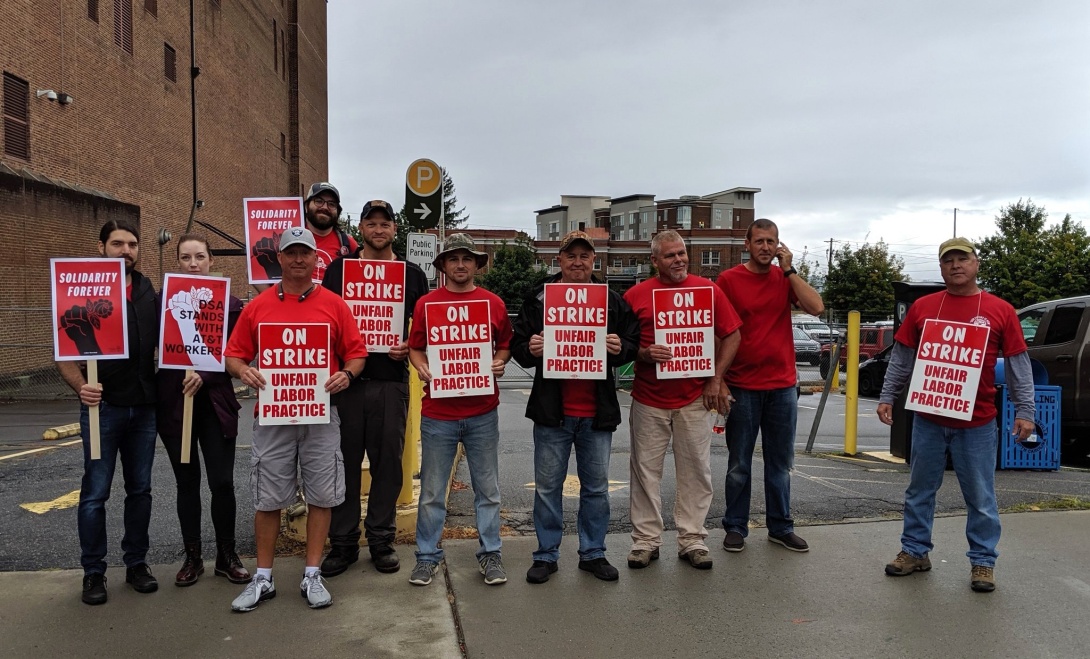Democratic socialism takes off in Southern metros

Members of the DSA chapter in Asheville, North Carolina, after a picket line protest in August 2019. (Photo courtesy of the local chapter.)
Before the 2016 election, Democratic Socialists of America's membership had flattened. In a good year, it would grow by about 1,000 members. Then Donald Trump became president. The day after his victory, the group's membership soared by nearly that much. In the next few months, more than 10,000 people, mostly young adults, joined the organization. New chapters sprung up across the country and the South, where democratic socialists won seats on city councils from South Fulton, Georgia, to Charlottesville, Virginia.
With 55,000 members, DSA is the largest U.S. socialist organization since the Communist Party fell apart in the 1950s amid revelations about the brutality of Joseph Stalin's reign in the Soviet Union. DSA champions a brand of socialism that calls for "a humane social order based on popular control of resources and production, economic planning, equitable distribution, feminism, racial equality and non-oppressive relationships." It envisions social ownership through worker-owned cooperatives or publicly owned enterprises.
But DSA hasn't always been so popular. That began to change when U.S. Sen. Bernie Sanders — a self-described democratic socialist — renewed national interest in democratic socialism in 2016. DSA credits his campaign as the start of the organization's surge.
"I was hoping that Charlottesville DSA could be the start of building left institutions that would give the left power beyond just praying for a presidential election," says Brian Campbell, who helped establish the chapter in January 2017. "I'd say the vast majority of our membership sought out DSA as an alternative to both Trump's presidency and the centrist drift of the Democratic party."
Democratic socialism in the South
Today there is a DSA chapter in every state in the South. In Virginia's capital of Richmond, DSA chapter membership chair Christopher Sloce says the group first started meeting around January 2017.
"We honestly were beneficiaries of that uptick," he told Facing South via email, referring to the membership bump DSA got after Trump's election. "I know that after he was elected I personally started trying to find ways to get involved, and I settled with the DSA due to the momentum."
In Asheville, North Carolina, the local DSA is getting a lift from Sanders supporters. The national organization recognized the city's chapter in mid-2018.
"The Bernie Sanders campaign has given a huge boost to Asheville DSA. In our two or so years as a chapter, we have never seen such a big surge in membership and engagement," chapter member Sky Wismer told Facing South in an email. "What's even more exciting and invigorating is that many of the new members the Bernie campaign has brought in have stayed active and engaged for long after their initial join date."
In Charlottesville, the local DSA chapter grew from a coffee shop meeting of a few left-leaning enthusiasts to about 60 engaged members over three years.
"I'm in my 40s. I was involved in some leftist politics in my 20s but then I drifted away from it because it often felt like I was fighting a losing battle," says Campbell. "In the past five or six years, things have started to feel more dire, but at the same time more winnable. Leftist politics is imaginable now."
His chapter is not as large as others outside the South, but it's ambitious.
In 2017, chapter member Ross Mittiga challenged longtime Virginia Democratic House of Delegates member David Toscano in the party's primary. Mittiga lost the contest,but won more than 30 percent of the vote. Then last November, chapter co-founder Michael Payne was elected to the Charlottesville City Council on a platform that emphasized affordable housing and economic equity.
"In Charlottesville, economic and racial inequality is something that really defines our local politics," Payne told Facing South. "What the majority of residents are seeing is rising rents, rising assessments, affordable housing crisis, gentrification, displacement of residents."
The Charlottesville area is among the top 25 metros where the income inequality gap between the top 1 percent and the bottom 99 percent is the widest, according to the Economic Policy Institute, a liberal-leaning think tank.
The other DSA-backed council members in Southern states are Seema Singh and Amelia Parker in Knoxville, Tennessee; Sean Parker in Nashville, Tennessee; Greg Casar in Austin, Texas; and Khalid Kamau in South Fulton, Georgia.
Kamau was elected to South Fulton's city council in 2017. The city is located south of Atlanta and has a population that's more than 90 percent black. Announcing his support for Sanders in 2020, Kamau called for far-reaching economic reforms.
"Capitalism will not save Black people," he wrote. "We have been, and continue to be, more exploited by American capitalism than anyone in the world. American capitalism must be reformed, and there is no one I trust more to accomplish these reforms than Bernie Sanders — the most consistent player in the political game."
A socialist future?
The DSA's message focusing on economic inequality and reforming capitalism resonates with many young Americans who are finding the American dream of earning more than their parents out of reach. That may explain why a recent Gallup poll found that young adults' positive opinion of capitalism has nosedived since 2010 while their positive opinion of socialism has climbed, with the two ideologies virtually tied at 50 percent since 2018.
In this year's Democratic presidential contest, young people have once again found a champion in Sanders. Though trailing former Vice President Joe Biden in delegates overall, the senator has won the overwhelming support of young voters in most primary contests to date. At the same time, more Democratic primary voters of all ages in North Carolina, Tennessee, and Texas said they had a favorable view of socialism than an unfavorable view, according to an NBC News exit poll.
Campbell in Charlottesville is focused on the long game.
"We need to build a bench of people who are in local government now, but can run for state government later, or are in state government now and can run for federal government later," he said. "If we want to have a real movement, it can't be just one guy," he added, referring to Sanders.
Tags
Rolando Zenteno
Rolando Zenteno is the inaugural recipient of the Julian Bond Fellowship with Facing South.
